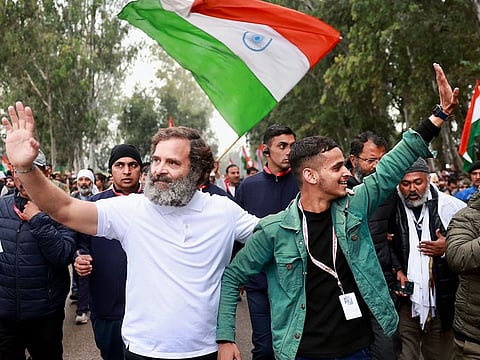India: Rahul Gandhi’s Bharat Jodo Yatra: Success or failure?
It didn’t succeed in providing a viable alternative to Modi-led BJP in the 2024 elections

Now that Rahul Gandhi’s “Bharat Jodo Yatra” (Unite India Journey) is nearing its end, one might legitimately ask what its impact has been on India. The Yatra was flagged-off on September 7 from Kanyakumari, India’s southern-most tip in Tamil Nadu, with Chief Minister M.K. Stalin joining Gandhi. Traversing 12 states, the walk from the south to the north of India covered 3,500km over 150 days. It is scheduled to end with the unfurling of the Indian flag in Srinagar, Jammu and Kashmir, on January 30.
The Indian National Congress intended it to be a mass movement to unite the country against the “divisive politics” of the Bharatiya Janata Party (BJP). This was a tall order since the basic premise was wrong. To dub India’s largest political party, the BJP, as divisive while considering the Congress the champion of unity is neither historically nor politically sustainable.
How divisive politics works in India
All political parties in India, some supposedly more than others, use divisive identity politics to consolidate their vote banks. Some parties are even identified with just one community, caste, language, region, or ideology. What, then, is the difference between the BJP and the Congress? The BJP has, on its road to success, consolidated the Hindu vote in India. Hindus make up nearly 80 per cent of India’s population. Naturally, wherever Hindus vote en masse, regardless of which party they vote for, that party will win.
Therefore, for any party to win against the BJP, it must divide the Hindu vote. The BJP, on the other hand, has also tried to divide the minority vote, though not without much success, wherever Muslims or Christians make up the majority, as in Kashmir, the North East, or certain constituencies, such as the city of Hyderabad in Telangana. The traditional Congress formula for electoral victory has been a minoritarian — as opposed to BJP’s majoritarian — coalition. This in itself is no more unitive than an appeal to Hindu voters, which has been the BJP’s principal political plank.
The BJP and the Congress would be mistaken if they felt that Indian voters care only for identity politics, ideology, or religious appeals. Most ordinary people in India expect the party in power to deliver good governance and development. The BJP has done this remarkably well, not only in the states where it is in power but also at the centre, where it has ruled since 2014.
One might even argue that in terms of people’s expectations and the actual delivery of goods and services, healthy competition between the BJP and the other political parties in power has helped the country grow and prosper. One big reason for this has been the transformation in the nature of Indian politics itself. The BJP has introduced a deindividualised, corruption-free, and professional style of governance. No individual politician, no matter how “big” or important, is allowed to stand above the party or create their fiefdom.
By “othering” the BJP so uncompromisingly, Gandhi has only exacerbated the divide not so much between the ruling party and the Congress but between those who support Modi and those who cannot abide him. Other Congressmen have a more constructive approach, which is to live with the current political dispensation, doing the duty of a good opposition party wherever possible. Gandhi, unfortunately, has taken the high road on this matter, branding not only Modi but the BJP itself as intolerable, if not illegitimate.
The result? Gandhi has attracted to himself only those who already hate Modi and the BJP. His Yatra has been unable to cut across party lines or, for that matter, actually turn into a mass movement. He has failed to awaken the conscience of the people or unite the country with a different notion of what India is or stands for, apart from the tired minoritarian cliches and anti-BJP rhetoric of the Congress party. In fact, not even all major Congress leaders have thought it fit to join him or be photographed with him.
To be fair, Gandhi’s long and arduous walk up the length of India, averaging over 20km a day, has been the most impressive activity he has undertaken in his political career. As a “dynast” and heir to a political fortune, Gandhi has never had to work for a living nor demonstrate any skill or competence in the real world as the source of his self-worth or value. But in this journey, he has shown not only determination and boldness but also very good physical health. Unfortunately for Gandhi and the Congress, these translate neither into political acumen nor votes.
Gandhi’s gaffes and tragedy
Besides, his political immaturity is reflected in all sorts of remarks and gaffes, which make him look ridiculous, especially when taken out of context. The BJP’s media team has done its best to capitalise on these to damage his image or discredit the seriousness of his endeavour. There have also been some unfortunate incidents on the way, such as the death by cardiac arrest of a 76-year Congress MP, Chaudhary Santokh Singh, while walking with him on January 15.
The ‘Bharat Jodo Yatra’ has not succeeded in providing the country with a viable alternative to the Modi-led BJP in the 2024 general elections. Nor has it succeeded in consolidating the anti-BJP forces and political parties under one big umbrella. What, then, has it accomplished? The answer is that it has reinstated Rahul Gandhi at the helm of a divided Congress. It has also put paid to the BJP’s agenda of a “Congress mukt Bharat” or a Congress-free India. The party’s win in the Himachal Pradesh elections is one proof of this. The other proof is that despite all his foibles and drawbacks, Rahul Gandhi is not giving up.
Sign up for the Daily Briefing
Get the latest news and updates straight to your inbox



